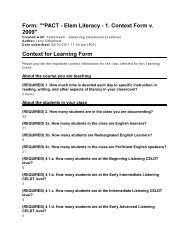The Tutoring Book - California State University, Sacramento
The Tutoring Book - California State University, Sacramento
The Tutoring Book - California State University, Sacramento
Create successful ePaper yourself
Turn your PDF publications into a flip-book with our unique Google optimized e-Paper software.
particular solution, you are still causing them to modify their paper in a particular way. Even in asking<br />
general, open-ended questions, you are usually leading them towards a particular idea or learning goal. In<br />
fact, in A Guide to Peer <strong>Tutoring</strong>, Paula Gillespie and Neal Lerner point out that question-posing can<br />
actually end up being quite directive: “<strong>The</strong> tutor is primarily trying to lead the writer to her interpretation<br />
by asking questions (evidence that questions aren’t necessarily a nondirective form of tutoring” (112).<br />
What is so interesting is that minimalist approaches still encourage this type of questioning. In fact, these<br />
leading questions are exactly what Jeff Brooks calls for in his essay on “Minimalist <strong>Tutoring</strong>.” He<br />
encourages “minimalist” tutors to “ask questions—perhaps ‘leading’ questions—as often as possible”<br />
(171).<br />
I am not bringing up this seeming contradiction to lampoon the idea that facilitative, non-direct<br />
tutoring should be a desired goal. But I would contend that while we should strive to be as non-directive<br />
and facilitative as possible, if you find yourself drifting into direct, prescriptive advice, don’t suddenly<br />
veer away from your particular point or suggestion; but rather use this moment as an opportunity to<br />
explain why this particular rhetorical decision seems important.<br />
For example, perhaps you are asking the student a general question about the structure or<br />
organization of his paper. Let’s say that his conclusion is an almost word for word repetition of his<br />
introduction. You might continue to ask peripheral questions around this issue.”How do you feel about<br />
your conclusion?” “I like how your conclusion is on point, doesn’t go off track.” “Is this a summary?”<br />
“It’s really similar to your introduction?” Eventually student the will realize that something is amiss.<br />
You’ve started being a little directive. You could continue to ask questions and seemingly non-directive<br />
riddles. But at this point you may have “blundered” your way into having to explain the difference<br />
between conclusions and summaries. And why not? <strong>The</strong>y may have heard this before in a teacher’s<br />
lecture, but why not take a moment to describe a particular habit or preference of academic writing. Yes.<br />
You are being direct telling them why a particular academic move seems important. But you are not<br />
revising their actual conclusion. You are giving them helpful rhetorical strategies as a “knowledgeable<br />
peer.”<br />
Trying to Be Direct but Not Directive:<br />
One thing to keep in mind, as you continue your first semester as a tutor, is that you are as much a<br />
colleague to these students as you are a tutor. You are as much a peer as you are a teacher. I think that this<br />
gives us a lot more freedom to bridge the gap between the varying discourse communities that separate us<br />
from academic writing. We too are experiencing the challenges of adapting to academic writing. It is not<br />
as though our own papers are written perfectly, or that we have achieved a mastery of the academic<br />
dialect. In her book on the post-modern writing center, Nancy Grimm argues that “Writing center tutors<br />
can also be much more direct about academic expectations without being directive” (34). She gives an<br />
example of Rebecca, a former tutee that eventually became a tutor in Grimm’s writing center. She praises<br />
Rebecca’s direct style of tutoring, because Rebecca knew “first-hand” the struggle to understand the<br />
peculiar dialect of the academic discourse community. She argues that “Rebecca’s habits of directness,<br />
which stand in contrast to the elaborate hedging of middle-class practices, make her a good writing coach,<br />
and I reclaim that directness” (51). While our own personal experiences acclimatizing to academic<br />
discourse are all quite varied and not directly comparable to Rebecca’s, I would venture to say that<br />
academic discourse is not our first language. And I think that as students we share the helpful quality of<br />
being able to stand outside of the institution—to describe academic moves in terms external to purely<br />
academic discourse. We are able describe things and relate to the students needs to an extent that the<br />
professors often can’t. And while we should never attempt to take directive control over a tutee’s paper,<br />
we should feel confident in giving them direct answers to direct questions.<br />
43

















